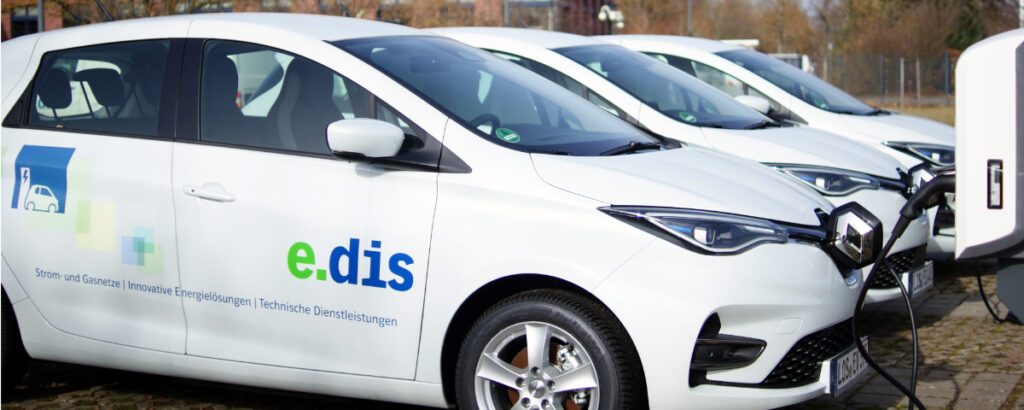Electrification of a company vehicle fleet

Project description
In the consulting project for the electrification of the vehicle fleet of E.DIS AG, RLI supported the company in the conversion of the company vehicle fleet from conventional to electric vehicles.
E.DIS AG is one of Germany’s largest network operators, whose network area includes Brandenburg and Mecklenburg-Western Pomerania. The company also offers various technical and infrastructure services. E.DIS AG’s fleet comprises several hundred vehicles and is made up of both passenger cars and commercial vehicles. For the analysis, 359 passenger cars were examined in more detail, spread across three main sites and numerous smaller secondary sites throughout the network area.
The client’s goal was to convert the majority of the passenger car fleet to battery-electric vehicles by 2025, thereby contributing to climate protection on the one hand and saving maintenance and fuel costs on the other.
Compare total costs of internal combustion and and e-vehicles
RLI was tasked with determining the savings potential and presenting a concept for the electrification of the company vehicle fleet. To this end, all vehicles classified as passenger cars were first examined in more detail as part of a fleet analysis and a so-called TCO calculation (“Total Cost of Ownership”): The total costs of the vehicle fleet including acquisition, energy requirements, and maintenance were determined. The locations of E.DIS AG and the vehicles available there were considered separately.
Methodically, all routes were identified that can be completed without intermediate charging and for which a charging option is necessary at the destination. According to the electrification rate, all locations where vehicles are stationed and all company-owned destinations that are frequently traveled to were equipped with charging infrastructure.
Timetable for conversion of all company vehicles
Based on the respective applicable procurement strategy, it was determined whether and how the target rate of 80 percent can be achieved by 2025 and what costs the vehicle fleet incurs compared to the status quo. Both new vehicle models and the CO2 price applicable from 2021 were taken into account.
Finally, RLI designed measures to increase employee acceptance of electric vehicles and their use in daily operations. This included, among others, information events and test drives for the workforce, an easy-to-use booking app, and an incentive system where points can be earned for electric trips.
Project duration: April 2020 – January 2021
Tasks
- Analysis of an optimized deployment approach and possible efficiency improvements of the vehicle fleet
- Creation of an electrification plan for the fleet taking into account the procurement strategy, based on the TCO calculation of all passenger cars
- Concept for the expansion of charging infrastructure at the fleet locations and high-frequency destinations
- Concept for increasing the acceptance of use
Results
- The number of passenger cars needed can be further reduced if all vehicles are organized into pools
- If the status quo is maintained in fleet composition, the fleet would cost up to 45 percent more in 2025
- Early replacement of older diesel models is worthwhile due to CO2 price despite shorter holding period
- 50 – 70 percent of parking spaces should be equipped with charging points
- Occupational charging cycles and occupancy times enable multiple use of charging points
- The introduction of digital logbooks can serve as an entry point for further optimization measures:
- Simplification of vehicle dispatch
- Optimized deployment coordination
- Coupling of charging infrastructure and vehicles in the booking app (possibility to reserve not only vehicles but also charging points in advance)
- Introduction of a car sharing offer